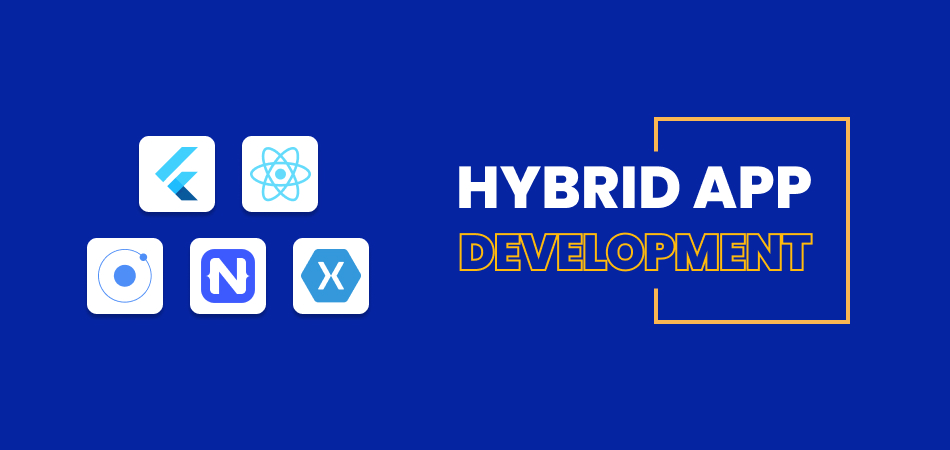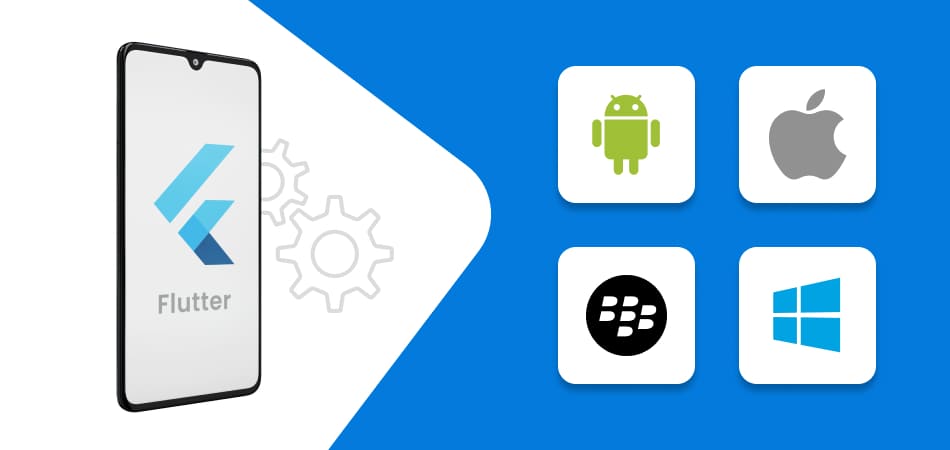In the ever-evolving landscape of mobile app development, businesses and developers constantly seek efficient ways to deliver robust, high-performing applications to users across multiple platforms. The greatest aspects of both native and web technologies are combined in hybrid app development, which has become an appealing solution. This comprehensive guide explores the nuances of hybrid app development, its benefits, best practices, trends, popular frameworks, tools, and use cases in 2024.
What is Hybrid App Development?
Hybrid app development refers to creating mobile applications that combine elements of both native apps and web apps. Unlike native apps, which are built for a specific platform (iOS or Android) using platform-specific languages and tools, hybrid apps are developed using web technologies like HTML, CSS, and JavaScript. These apps are then wrapped in a native container that allows them to run on multiple platforms while providing access to native device features.
Hybrid apps offer a middle ground, enabling developers to write a single codebase that works across different operating systems. This approach significantly reduces development time and costs while maintaining the look and feel of a native app.
Benefits of Hybrid App Development
The benefits of hybrid app development can be summarized in the following table:
| Benefit | Description |
| Cross-Platform Compatibility | Hybrid apps run on multiple platforms, allowing developers to target a broader audience with a single codebase. |
| Cost-Effective | Reduces development and maintenance costs as only one codebase is needed for multiple platforms. |
| Faster Development | Accelerates development time since the same codebase is used across platforms. |
| Ease of Maintenance | Simplifies maintenance and updates because changes need to be made only once and reflected across all platforms. |
| Access to Native Features | Through plugins and APIs, hybrid apps can access native device functionalities like the camera, GPS, and contacts. |
| Offline Support | Provides offline functionality using local storage, ensuring that users can access app content even without an internet connection. |
| Performance Improvements | Modern hybrid frameworks offer near-native performance, making them suitable for most use cases. |
| Unified User Experience | Ensures a consistent user experience across different platforms, enhancing user satisfaction and engagement. |
| Scalability | Easier to scale as the app grows, accommodating additional features and platform support without significant changes to the underlying codebase. |
| Enhanced Integration | Facilitates integration with various backend services and third-party plugins, streamlining the development process and enabling advanced functionalities. |
Best Practices for Hybrid App Development
To maximize the benefits and ensure the success of hybrid app development, developers should adhere to several best practices:
1. Choose the Right Framework
Selecting the appropriate hybrid framework is crucial. Popular options like React Native, Ionic, and Flutter each have their strengths and are suited to different project needs. Evaluate the requirements of your app and the expertise of your team before making a decision.
2. Optimize Performance
Although hybrid apps have come a long way in terms of performance, it’s essential to optimize them to ensure a smooth user experience. Techniques such as lazy loading, minimizing DOM access, and using hardware acceleration can significantly enhance performance.
3. Prioritize User Experience
The success of any app hinges on its user experience (UX). Design intuitive, responsive, and visually appealing interfaces that provide a seamless experience across all devices and platforms. Consistency in design and interaction patterns is key to a unified user experience.
4. Leverage Native Plugins
Hybrid frameworks offer a plethora of plugins to access native device features. Utilize these plugins to enhance functionality and ensure that your app can take full advantage of device capabilities.
5. Regular Testing and Debugging
First thing to do before deployment is testing thoroughly which is crucial to rectify the errors and fix them. Use automated testing tools to ensure your app performs well across different devices and platforms. Debugging tools provided by hybrid frameworks can help streamline this process.
6. Maintain a Modular Codebase
A modular codebase is easier to maintain and scale. Break down your code into smaller, reusable components and modules to simplify development and future updates.
7. Monitor and Optimize App Size
Hybrid apps can become bloated if not managed properly. Regularly monitor the app size and optimize assets, code, and dependencies to keep the app lightweight and performant.
8. Stay Updated with Framework Releases
Hybrid frameworks are constantly evolving, with new features, improvements, and bug fixes. Stay updated with the latest releases and incorporate them into your development process to leverage new capabilities and enhancements.
Trends in Hybrid App Development for 2024
Technology developments and shifting user expectations are driving the ongoing evolution of hybrid app development. Here are some of the key trends shaping hybrid app development in 2024:
1. Enhanced Performance with WebAssembly
WebAssembly (Wasm) is transforming the performance capabilities of hybrid apps. By enabling code to run at near-native speed, Wasm is bridging the performance gap between native and hybrid applications, making hybrid apps more suitable for performance-intensive tasks.
2. Increased Use of Progressive Web Apps (PWAs)
Progressive Web Apps (PWAs) are gaining traction due to their ability to deliver app-like experiences through the web. Hybrid apps are increasingly incorporating PWA principles, such as offline support, push notifications, and home screen installation, to enhance user engagement and accessibility.
3. AI and Machine Learning Integration
The integration of Artificial Intelligence (AI) and Machine Learning (ML) is becoming more prevalent in hybrid app development. From personalized user experiences to advanced data analytics, AI and ML are empowering hybrid apps with intelligent features and capabilities.
4. Advanced Security Measures
With the rise in cyber threats, security has become a paramount concern in app development. Hybrid apps are adopting advanced security measures, including end-to-end encryption, biometric authentication, and secure coding practices, to safeguard user data and ensure compliance with regulations.
5. Enhanced Development Tools
Development tools for hybrid apps are becoming more sophisticated, offering improved debugging, testing, and performance monitoring capabilities. Tools like Flutter’s DevTools, React Native’s Flipper, and Ionic’s Appflow are streamlining the development process and enhancing productivity.
6. Cloud Integration
Cloud services are playing a pivotal role in hybrid app development. Cloud-based backend services, storage solutions, and APIs are enabling hybrid apps to scale seamlessly, offering enhanced performance and reliability.
7. Cross-Platform UI Frameworks
Cross-platform UI frameworks, such as Google’s Flutter and Microsoft’s MAUI, are gaining popularity. These frameworks allow developers to create highly performant and visually appealing user interfaces that work seamlessly across multiple platforms.
8. Focus on Accessibility
Ensuring accessibility is becoming a critical aspect of app development. Hybrid apps are increasingly adopting accessibility standards and guidelines to provide inclusive experiences for users with disabilities, ensuring compliance with legal requirements and enhancing user satisfaction.
Popular Frameworks for Hybrid Development
Several frameworks have gained popularity for hybrid app development due to their robustness, community support, and feature sets. Here are some of the most popular frameworks in 2024:
1. React Native
React Native, developed by Facebook, is one of the most widely used frameworks for hybrid app development. It allows developers to build apps using JavaScript and React, offering a rich set of components and libraries. React Native provides near-native performance and supports a wide range of third-party plugins.
2. Flutter
Flutter, developed by Google, has rapidly gained traction in the hybrid app development community. It offers a wide range of pre-designed widgets and is programmed in the Dart programming language. Flutter provides excellent performance and allows for creating visually appealing, responsive UIs. The development process is accelerated greatly by its “hot reload” function.
3. Ionic
Ionic is a popular open-source framework that allows developers to build hybrid apps using web technologies like HTML, CSS, and JavaScript. It provides a library of pre-built components and integrations with Angular, React, and Vue.js. Ionic’s extensive plugin ecosystem enables access to native device features.
4. Xamarin
Xamarin, owned by Microsoft, enables developers to build hybrid apps using C# and .NET. It offers robust tools for creating native-like experiences and supports a wide range of platforms, including iOS, Android, and Windows. Xamarin’s integration with Visual Studio enhances the development workflow.
5. PhoneGap/Cordova
PhoneGap, also known as Apache Cordova, is one of the earliest frameworks for hybrid app development. It allows developers to use web technologies to build apps and access native device features through plugins. While newer frameworks have gained popularity, PhoneGap remains a viable option for certain use cases.
Popular Tools for Building Hybrid Apps
Building hybrid apps requires a suite of tools to streamline development, testing, and deployment. Here are some of the popular tools used in 2024:
1. Visual Studio Code
Visual Studio Code (VS Code) is a powerful, open-source code editor widely used for hybrid app development. Its extensive library of extensions and integrations with various frameworks make it a versatile tool for coding, debugging, and version control.
2. Android Studio
Android Studio is the official integrated development environment (IDE) for making Android applications.It provides a comprehensive suite of tools for building, testing, and debugging Android apps, making it essential for hybrid developers targeting the Android platform.
3. Xcode
Xcode is Apple’s official IDE for iOS and macOS development. It offers a robust set of tools for building, testing, and deploying apps on Apple’s platforms. Hybrid developers targeting iOS often use Xcode for its powerful debugging and performance analysis capabilities.
4. Expo
Expo is a toolchain built around React Native, offering a streamlined development workflow. It provides a set of tools and comprehensive libraries to simplify the development process. Expo includes features such as over-the-air updates, a built-in app store, and an easy-to-use development environment that helps developers build, test, and deploy React Native applications quickly and efficiently.
5. Appcelerator Titanium
Appcelerator Titanium is a platform that enables developers to create native mobile apps using JavaScript. It provides a comprehensive set of APIs and supports a wide range of devices and operating systems. Titanium’s Alloy framework facilitates the development of complex, high-performance applications with a modular architecture.
6. NativeScript
NativeScript is an open-source framework for building cross-platform apps using JavaScript, TypeScript, or Angular. It provides direct access to native APIs, ensuring that hybrid apps can leverage native device features effectively. NativeScript is a well-liked option for hybrid programming since it provides an extensive collection of UI components and a thriving community.
Popular Use Cases of Hybrid Apps
Hybrid apps are versatile and can be used in various industries and scenarios. Here are some popular use cases:
1. E-Commerce Applications
Hybrid apps are ideal for e-commerce platforms due to their cross-platform compatibility and faster development cycles. Companies like Amazon and Alibaba use hybrid apps to reach a broader audience, providing a seamless shopping experience across different devices.
2. Social Media Apps
Social media platforms like Instagram and Twitter have adopted hybrid app development to ensure consistent user experiences across iOS and Android. Hybrid apps enable these platforms to roll out updates quickly and efficiently.
3. Educational Apps
Educational apps like Coursera and Khan Academy leverage hybrid technologies to provide interactive learning experiences. These apps offer offline support, multimedia content, and cross-platform accessibility, making education more accessible to users worldwide.
4. Financial Services
Hybrid apps are widely used in the financial sector for banking, investment, and payment solutions. Apps like PayPal and Venmo utilize hybrid development to deliver secure, reliable, and user-friendly services across multiple platforms.
5. Healthcare Apps
Healthcare applications, such as fitness trackers and telemedicine platforms, benefit from hybrid development. Apps like MyFitnessPal and Doctor on Demand use hybrid technologies to offer real-time data synchronization, cross-platform functionality, and access to native device features like sensors and cameras.
6. Business Productivity Tools
Hybrid apps are popular in the business sector for productivity and collaboration tools. Applications like Slack and Trello use hybrid development to provide seamless communication, task management, and project collaboration across various devices and platforms.
7. Entertainment and Media
Entertainment and media apps, including streaming services and news platforms, leverage hybrid development to deliver rich multimedia experiences. Apps like Netflix and BBC News ensure consistent performance and user engagement through hybrid technologies.
Conclusion
Hybrid app development has revolutionized the way we approach mobile application development, offering a balanced blend of performance, cost-efficiency, and cross-platform compatibility. As we move further into 2024, the advancements in frameworks, tools, and best practices continue to enhance the capabilities of hybrid apps. By staying abreast of the latest trends and adopting a strategic approach, developers and businesses can leverage hybrid app development to create innovative, high-performing applications that cater to the diverse needs of users across the globe. Whether you are a seasoned developer or a business owner looking to expand your digital presence, hybrid app development presents a compelling pathway to achieving your goals in the dynamic world of mobile technology.



